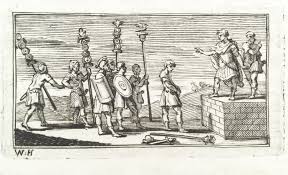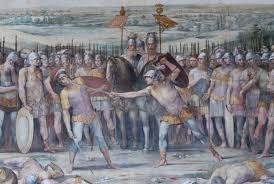The ancient Romans were governed by the laws of Twelve Tables. There were severe Roman Punishments given to those committing crimes such as forgery, adultery, patricide, etc. The ancient Roman slaves had no inherent rights and hence the punishments inflicted on them were tremendously severe.
Different kinds of punishments
The different kinds of punishments inflicted on the ancient Romans comprised of fines (damnum), stripes (verbena), bonds (vincula), infamy (Ignominia), retaliation (Talio), banishment (Exilium), slavery (Servitus) and lastly, death.

Any ancient Roman accused could not be sentenced to death unless convicted of treason. However, if a Roman citizen was sentenced to death, he could not be crucified.
Roman Punishment for forgery
The ancient Romans had various methods of inflicting the death penalty. It was by means of the harshest method that the accused was punished. For instance, the most common methods of dispensing death penalty was by beheading (percussion secure), strangling in prison (strangulation), throwing a criminal from the Tarpeian Rock (dejection e rule Tarpeia), burying a person alive, throwing a criminal into a river (projection in profluent) or by crucifying the criminal.
Roman punishments facts
A Roman citizen convicted of patricide that is, killing of one’s own father, was punished with projection in profluent.

It was carried out in such a manner that as soon as a person was convicted of patricide he was blindfolded, then taken to the field of Mars, outside the city of Rome, stripped off all hoes clothes and accessories, then brutally whipped, after which he was trapped and tied in a sack and then thrown into a river or the sea. The sack in which the criminal was put was called Culeus.
Roman Punishment for forgery
For the crime of forgery, the death penalty was not announced, unless the convicted was a slave. The non-slave freemen who were convicted of forgery were banished and were deprived of their property, rights, and privileges.

Crimes such as giving a false testimony and other such offenses were termed as misdemeanors and such criminals were exposed to fire. Those committing adulteries were punished corporally.
The degree of Punishment
The degree of punishment depended upon the severity of the criminal offense. The more heinous a crime, the harsher it’s penal repercussions.



